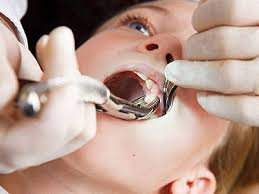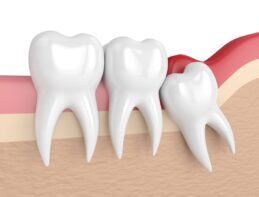Sign up to begin the "X-ray & Evaluation" process with Dr. Dennis!
The following steps will take place once you send your name & email...
Tooth Extractions
An extraction means:
Having a tooth removed, usually due to infection, trauma, or crowding, such as wisdom teeth.
May be required for a variety of reasons:
If you have been seriously damaged by a traumatic injury, or advanced tooth decay or periodontal disease.

Wisdom Teeth Extraction:
Typically, tooth extractions are performed to remove wisdom teeth.
Most people don't have enough space in their mouths for their wisdom teeth, so pulling them is advised to prevent teeth from shifting, causing pain, and other problems from over-crowded teeth
No matter what your specific reason maybe, if you're having a tooth pulled you may be wondering what to expect, and how long it will take to recover from your extraction. Here are a few things to keep in mind during post-op care:

The First 24 Hours
During the first 24 hours after your tooth has been pulled, several things will happen.
Blood clots will begin to form, the sutures in your mouth will help the tissue begin to heal.
You may experience some minor pain and bleeding in the first 24 hours
Typically, you'll be given a prescription for a pain reliever to aid you through this process.
Swelling tends to peak around 24 hours post-surgery.
Ice packs applied externally help manage the swelling.
You may return to non-strenuous activities, such as driving and working an office job, within a day of the surgery.
However, athletic activities may be limited, and workers in active positions may need to take extra time off.
1-2 Days Post Extraction
The first two days after your extraction require the most care; this is when your mouth is doing the majority of its healing.
Get plenty of rest for at least the first 24 hours post-extraction.
Leave the first gauze in for a few hours to let the blood clot form; after that, you may change your gauze as often as necessary.
For the first few days and only when necessary, you may rinse your mouth very gently.
Take pain medication as needed and prescribed; in some cases, over-the-counter pain relievers are enough.
Avoid smoking or drinking through straws as the suction creates pressure in the mouth that can cause complications with your blood clot. It's crucial to avoid both of these for the first few days of your healing process.
Elevate your head when sleeping or resting; use additional pillows to prop your head up to help your healing process.
3 Days Post Extraction
After about three days, the empty tooth socket will have mostly healed. There should be no more bleeding; the swelling should be minimal at this point.
You may still experience some tenderness or soreness, but you should no longer feel pain or discomfort.
During this stage of healing, it's important to leave the clot alone, which requires additional hygiene procedures, including:
Saline rinses: gently rinse your mouth with a saline solution or warm saltwater. This helps prevent bacteria from growing in the area and prevents infection.
Brush and floss: you may start to brush and floss your teeth as usual, but avoid the extraction site. The saline or saltwater will be enough for now to clean the extraction area.
Eating soft foods: plan to eat soft foods throughout the healing process to avoid food getting food trapped in the socket. Soups, yogurt, or applesauce are among the favorites.
Common Questions About Dental Extractions
Having your tooth pulled may hurt but you will receive anesthesia before the procedure to eliminate the pain. Following the procedure, you will usually take Ibuprofen for swelling or prescription pain medication to help you manage the temporary pain.
A tooth extraction may be completed in 20-40 minutes. If you're having multiple teeth extracted, expect each additional tooth to take another 3-15 minutes of time depending on its location.
Numbness may last 2 -4 hours
Once Dr. Dennis examines your x-rays and determines the best remedy for your situation, she'll either do an implant, a bridge, or a partial. You will have a full understanding of what she recommends after your evaluation.
After 1 to 3 months of healing.
The initial healing period usually takes about one to two weeks. New bone and gum tissue will grow into the gap. Over time, however, having a tooth (or teeth) missing can cause the remaining teeth to shift, affecting your bite and making it difficult to chew.
We recommend you to chew on the other side and only eat soft foods for the first three days after the extraction.
We will give you a full list of instructions to follow after your extraction.
You may eat after your wisdom tooth extraction; however, wait for the anesthesia to wear off to avoid biting the inside of your cheek, lip, or tongue. It's best to drink liquids and only eat soft foods for the first 24 hours after surgery.
The cost for tooth extraction varies widely depending on whether the tooth is impacted. A simple extraction in the U.S. usually costs between $75 and $200 per tooth, and may be more depending on the type of anesthesia needed. The cost to remove impacted teeth is significantly higher and can land anywhere between $800 and $4,000. But here in Mexico, with Dr. Dennis, you will pay ¼ of the lowest cost shown here.
TESTIMONIALS
We needed exams, x-rays, and cleanings. Dr. Dennis (spelled Denise in the US) was very thorough and kind. Nancy and I both needed a crown, I needed an extraction, and Nancy needed an extraction and implant. We were totally blown away by the inexpensive cost of all these procedures. We estimated a savings of approximately 75% compared to US pricing. Nancy and I drove the 90 miles to Algodones and were met at the border crossing by the Dr's staff and escorted to their office. Nice Touch! We did not fly but it would be well worth the expense. We are both so pleased with the work done. It was painless and our teeth are looking and feeling terrific! Dr. Dennis and the staff were awesome in every way. They were so very kind, caring, and considerate. Where else have you been to a dentist where you got a hug from your dentist and her receptionist? We both love Algodones. The shopping, the restaurants, and yes even the margaritas are fantastic. We have always felt very safe there. It is well patrolled by local police and every effort is made to protect the Americans. The Clinic is both modern, and spotless. It is totally disinfected between patients. Margo, her receptionist is wonderful as well. she makes you comfortable and as a special bonus keeps you laughing! Take your business to Dr. Dennis; you won't be sorry! Syracuse, Utah
| Dennis & Nancy Anderson |
I had two loose teeth that had to be extracted and she also created a temporary partial while I heal and wait to begin the implant procedure. Dr. Dennis did a wonderful job; my experience was excellent. I saved a lot of money. The town was comfortable and safe. Her clinic is spotless, and her team is so friendly and kind. I recommend her highly and tell everyone what a great job she does. Edmonton, Alberta, Canada
| Douglas White |
The Evaluation consists of: all x-rays and a complete dental examination with Dr. Dennis
The fee for your evaluation will be reimbursed if you elect to have a dental procedure.